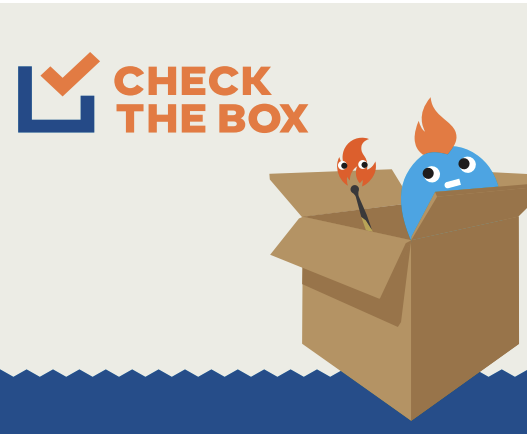
Data shows that every year, nearly 1,500 hazmat incidents occur as a result of undeclared hazmat shipment materials. To prevent this problem, the Pipeline and Hazardous Materials Safety Administration (PHMSA) has created an initiative called ‘Check the Box’.
Hazardous materials transportation is a process that involves a wide range of risks and challenges. These risks can be reduced to a great extent by properly identifying, classifying, and handling different types of hazardous materials. Unfortunately, many shippers fail to understand and communicate the hazards associated with the materials they ship, which can increase the risk of hazmat incidents greatly.
What is ‘Check the Box’ Campaign?
The ‘Check the Box’ campaign centers around a simple yet impactful concept – urging shippers and other parties involved in hazardous materials transportation to declare the presence of hazardous materials in their shipments and communicate the associated hazards clearly. By emphasizing the importance of accurate and transparent communication, the campaign seeks to create a culture of responsibility within the hazmat shipping industry and make sure that all parties involved are fully aware of the contents they are handling.
The initiative underscores the fact that even seemingly ordinary packages may contain hazardous materials – ranging from flammable to corrosive chemicals. The campaign’s primary objective is to curb the occurrence of undeclared hazardous materials during transportation, as such omissions can lead to severe consequences, including accidents, injuries, and environmental damage.
Through targeted educational programs, outreach efforts, and collaboration with industry stakeholders, the ‘Check the Box’ campaign encourages shippers and carriers to prioritize safety by meticulously identifying and declaring hazardous materials in their shipments. The aim is not only to meet regulatory compliance but to enhance overall safety standards, reduce the likelihood of incidents, and safeguard the well-being of those involved in the transportation process as well.
How Can Hazmat Shippers Identify Hazardous Materials Using the SDS?
The best way to find out whether a particular product is hazardous is to check the Safety Data Sheet (SDS) provided by the manufacturer. The SDS is an important document that provides detailed information about the properties and hazard potential of a product and provides instructions on how to handle it safely. It typically includes the following details.
- The name of the product and its recommended uses
- Ingredients contained in the product and their chemical composition
- Hazard classification of the product and the hazards associated with it
- Physical and chemical properties of the product and its ingredients
- Handling and storage instructions
- Ventilation and personal protective equipment requirements
- Toxicological information
- Measures to be taken in case of accidental release or exposure
- First-aid measures to be taken in case of accidental release or exposure
How Hazardous Materials Training Can Complement the Check the Box Campaign and Reduce the Risks of Undeclared Hazmat Shipments
Increased Awareness
Hazmat training can provide shippers and other parties involved in the shipping process with a comprehensive understanding of what constitutes hazardous materials. It can raise awareness about the potential risks associated with undeclared hazardous materials and emphasize the importance of accurate identification and documentation.
Proper Classification
Hazmat training can teach shippers how to correctly classify hazardous materials according to regulatory standards. Proper classification is crucial for accurate documentation and the implementation of appropriate safety measures during transportation.
Effective Communication
Hazmat training emphasizes the significance of clear and effective communication throughout the supply chain. Shippers can learn how to communicate the presence of hazardous materials accurately, which can reduce the risk of undeclared or mislabeled shipments.
Safe Handling Procedures
Hazmat training can provide shippers with the knowledge of safe handling procedures for different types of hazardous materials. Proper handling practices can mitigate the risk of accidents, spills, and other incidents during transportation.
Emergency Response Preparedness
Hazmat training can educate shippers on emergency response protocols in the event of spills, leaks, or accidents during transportation. As a result, they can be better prepared to handle emergencies, minimizing the impact of incidents and safeguarding lives and the environment.
Risk Assessment Skills
Hazmat training can equip shippers with the skills needed to assess and identify potential risks associated with specific materials and transportation scenarios. This proactive approach allows for the implementation of preventive measures to mitigate risks before incidents occur.
Documentation Accuracy
Hazmat training emphasizes the importance of accurate and complete documentation, including the proper completion of shipping papers and labels. Proper documentation can significantly reduce the likelihood of undeclared or mislabeled shipments.
Choose Industry-Leading Online Hazmat Training Courses from Hazmat University
At Hazmat University, we believe that regular training is the best way to reduce the risk of shipping undeclared or improperly prepared hazardous materials. Our online hazmat training courses are designed to equip hazmat employees with the knowledge and skills needed to handle hazardous materials responsibly.
Whether you are a shipper, freight forwarder, or involved in hazmat shipping in any capacity, our online hazmat training courses can educate you on the specifics of hazmat shipping, regulatory requirements, classifying, labeling, marking, and packaging different types of hazardous materials, emergency response procedures, and many more.
Easy to sign up and even easier to complete, our flexible, engaging, and self-paced online hazmat training courses can contribute to safer hazmat transportation, reduce the incidents of undeclared hazardous materials, and protect the well-being of those involved in the shipping and handling process.
Call us today at 844-307-8345 or fill out this contact form for more information on our online hazmat training courses.
Be Confident. Be Competent. Be Compliant.